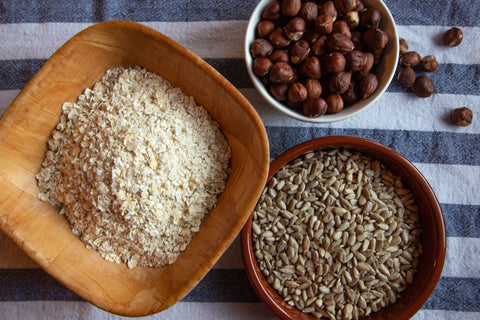How can you fight off inflammation?
Posted on January 29 2020

Fighting off inflammation is a hot topic. It seems to be the focus of every health issue out there, or at least linked somehow. As if it weren’t bad enough that inflammation is connected to long-lasting problems inside your body, it also effects your skin and your mental health. It’s no surprise we’re all looking for ways to ward it off. While there’s no magic fix to make you immune to inflammation, there are some simple lifestyle changes you can make to reduce the risk. Here are our top tips to help you extinguish inflammation.
In order to ward of inflammation, you need to keep topped up with the good stuff. Specifically, this means packing in plenty of foods such as:
- veggies,
- healthy fats,
- lean proteins,
and
- whole grains.
Foods high in fiber promote healthy gut bacteria, so you'll keep your intestines happy. And anything rich in antioxidants, like blueberries and leafy greens, help the body neutralize the free radicals that cause inflammation. A healthy dose of omega-3 will do you some good, too, as the fatty acids inhibit the production of prostaglandins—a lipid that triggers the inflammatory response.
Cut out the bad bits
There are also some foods that should be avoided. Some well-known offenders are processed and fried foods, added sugars, and high-glycemic index foods (like white bread or white pasta). You already know these are bad for your waistline, but they also inflame your body. Sugar (particularly fructose and glucose) triggers the release of pro-inflammatory molecules called cytokines that fire up the inflammation in your body. And wheat products like white bread can quickly cause inflammation in your body due to a spike in insulin. Though the occasional chippy tea won’t do you much harm, keeping fried food and any triggers out of your daily diet will do you a favour in the long run.

Keep an eye on nightshades
Some people also have sensitivities to certain foods which can lead to inflammation. For example, nightshades (like aubergines and tomatoes) can sometimes worsen autoimmune issues. Although they’re a group of pretty nutritious foods, some people believe they contribute to health problems. This is because they contain a group of substances called alkaloids, which can aggravate digestive issues in particular.
Healthy guts can deal with these chemicals just fine, but if your digestive system is already compromised by an autoimmune disease, you might have trouble with them. For example, some kinds of alkaloids increase the power of your immune response, which exactly what you don’t want when it’s already in overdrive.
Watch out for wheat
Another common sensitivity is to gluten, or wheat. In those who suffer with celiac disease, gluten triggers a powerful autoimmune response that damages the small intestine and affects its ability to absorb nutrients. This can lead to further gastrointestinal issues related to inflammation. Even if you don’t suffer from celiac disease, your body can still have an immune reaction to gluten or another substance in wheat.
If you’re not sure which foods in particular are causing a reaction in your body, an elimination diet is the best way to go. This can help you pinpoint exactly what’s causing your inflammation, as everyone deals differently with allergens and irritants. For more on what food can impact inflammation, take a look at our article on what causes inflammation.

Rethink your routine
Besides switching up your diet, improving your daily habits can also have a major impact on alleviating inflammation. Keeping up a consistent exercise routine is one way to do this, and it works in a couple of different ways:
- First off, studies have shown that even a 20-minute session of moderate exercise is enough to stimulate your immune system to produce an anti-inflammatory response in your body’s cells.
- Secondly, getting active on the regular will most likely help you stay at a healthy weight, which is another cause of inflammation. Fat cells actually fuel the inflammatory response in your body. In fact, they secrete a type of hormone which contributes to inflammation, so keeping your weight in check is key to suppress it.
However, it’s worth noting that if you throw yourself into strenuous activity when your body isn’t used to it, it can cause more inflammation than it prevents. The trick is to build up your exercise routine slowly, then keep it consistent.
There are also other habits that can cause flare ups. Most smokers experience inflammation even years after ditching the cigarettes. Alcohol has the same negative effect on your body, creating intestinal inflammation that can eventually spread throughout your body. Everyone has their vices, but considering cutting them out is essential if you want to stay healthy in the long run.

Keep rested up
So, you know that your physical health influences your levels of inflammation. But what about your mental wellbeing? Stress is a massive trigger when it comes to inflammation, releasing hormones like adrenaline and cortisol that then go on to promote inflammatory symptoms. In other words, not only is some down-time good for your mind, it also calms your body. Prioritising self-care is important if you want to support your body’s anti-inflammatory abilities.
When we talk about self-care, we mean whatever helps calm your mind. It might be:
- reading,
- meditating,
- socialising,
or
- simply getting outside for some sunshine.
It shouldn’t be viewed as a luxury, but a priority. There’s no one-size-fits-all strategy when it comes to self-care, so it’s important to schedule time to focus on your needs specifically. If you’re mentally stimulated all the time in your work or education, make time for physical self-care such as getting enough quality sleep. If you’re retired or work from home, you might want to incorporate more social self-care into your routine, such as making effort to see your friends face-to-face. Prioritizing activities to suit your needs is really important.

Quality over quantity
Another priority should be quality sleep, which shouldn’t be underestimated. Getting enough proper shut-eye means your body gets plenty of time to repair and refresh itself. The same circadian rhythms that control your sleep-wake cycle also impact your immune system, and in turn, your levels of inflammation. It’s easy to write off a bad night’s sleep as no big deal, but getting enough restful sleep each night makes a huge difference on a cellular level. Give your body the rest and care it needs, and it will thank you.
What to remember
Inflammation is the starting point for countless health conditions, from stomach to skin concerns. But thankfully, there are steps you can take to avoid the chronic kind. There’s no magic fix, but the combination of changes we’ve mentioned can help to stop chronic inflammation from holding you back. It can be overwhelming when wondering what the cause is, but once you figure out the root issue, you can start to make the lifestyle changes you need to. You’ll soon be well on your way to a healthier body and mind.
Shop Omega-3 >





